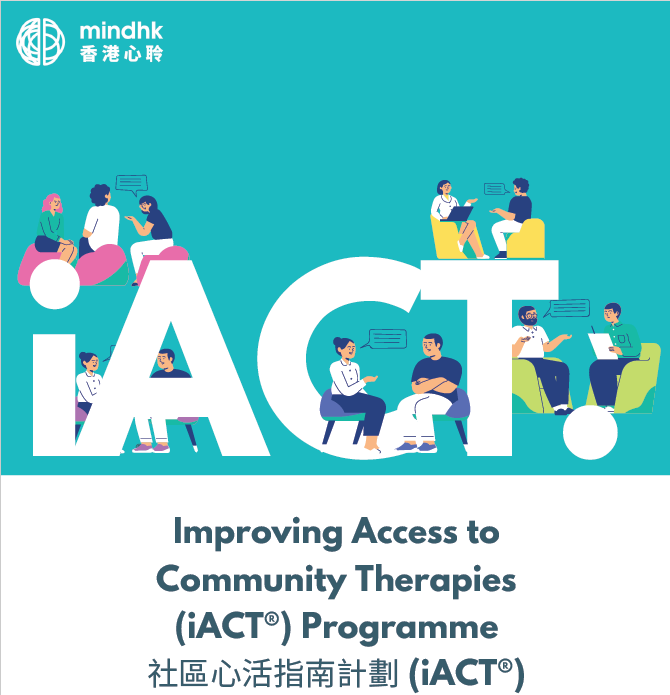iACT Programme
St John’s Cathedral Counselling Service X MindHK
Improving Access to Community Therapies (iACT®) Programme

St John’s Cathedral Counselling Service will be a Host Organisation for two Wellbeing Practitioners (WP). They will be offering 6 free sessions of guided self-help (GSH) based on Acceptance and Commitment Therapy (ACT).
Guided self-help (General information)
Designed for adults aged 18 – 65
為18-65 歲成年人而設
With eligibility criteria
符合參與資格
Initial intake assessment (45-60 mins) + 6 GSH sessions
初步評估面談 (45-60分鐘) + 6節指導式自助治療
1 session per week
每星期一節
40-50 minutes per session
每節約40-50分鐘
What is guided self-help?
甚麼是指導式自助治療?
One-on-one sessions where clients are guided through a workbook to explore and assess their current difficulties, coping strategies, values, and goals. Clients are also taught ACT-based skills to help manage their difficulties, and are encouraged to practise these skills throughout the guided self-help process.
服務使用者會透過一對一個人面談服務,去探索他們的近期困難,價值,短期目標,應對方法等等;並根據一本以接納與承諾治療的技巧為基礎的自助手冊輔助他們完成練習,應付生活的困難。
Who is the target group for wellbeing check-in and guided self-help?
免費心理健康諮詢及指導式自助治療的服務對象
The iACT programme is suitable for:
社區心活指南計劃適用於:
Adults aged 18-65
成年人介乎18至65 歲
Individuals with a specific set of presenting problems
經歷着以下問題的人士
- Anxiety problem (including social, generalised, health anxiety, work anxiety)焦慮問題 (包括社交焦慮、廣泛性焦慮症、疑病症、工作焦慮)
- Mild to moderate depression 輕微至中度抑鬱
- Other emotional challenges including (but not limited to)
- 其他情緒困擾,包括(但不限於)
- Low self esteem 自尊心低落
- Perfectionism 完美主義
- Mild anger issues 輕度憤怒問題
- Interpersonal or relational challenges 人際或關係方面的問題Low motivation 缺乏動力
- Lack of purpose 欠缺目標
- Numbness 麻木
Exclusion Criteria:
排除準則:
Adults with the following features/presentations are not eligible for the iACT programme and should automatically lead to an onward referral:
有以下徵狀/表現的成年人不適合參加社區心活指南計劃,並應自動安排轉介跟進:
High severity on depressive score (PHQ-9 >= 20)
抑鬱症評分屬高度嚴重(病人健康狀況問卷 (PHQ-9) >= 20)
High or imminent risk (according to scores on PHQ9 question no. 9 and information emerging at triage assessment, including indication of plan and action or the lack of protective factor)
有高或即時風險(根據病人健康狀況問卷 (PHQ-9) 第9題的分數及在評估中呈現的資訊,包括有計劃和行動的迹象或缺乏保護因素)
Any of the following presentations or situations:
- 以下任何一種情況:
- Diagnosis or features of a mental health problem that is not suitable for low-intensity intervention: 以下診斷並不適合接受低密度的介入治療:
- Obsessive compulsive disorder 強迫症
- Post-traumatic stress disorder 創傷後壓力症
- Bipolar disorder 躁狂抑鬱症
- Schizophrenia and other psychotic disorders 精神分裂症及其他精神障礙Dissociative disorders 解離症
- Personality disorders 人格障礙
- Eating disorders 飲食失調
- Gender dysphoria 性別焦慮
- Paraphilic disorders 性癖症
- Anger issues as primary presenting concern (without anxiety or depression) 憤怒問題 (沒有焦慮或抑鬱症)
- Sleep issues as primary presenting concern (without anxiety or depression) 睡眠問題 (沒有焦慮或抑鬱症)
- Substance related disorders 與藥物使用相關的障礙
- History of trauma or abuse that is considered highly relevant to the current presenting problem they are seeking support for 擁有與尋求支援的問題相關的創傷或虐待歷史
- Planned changes to psychotropic medication during the period of iACT intervention 已計劃在接受支援期間改變精神藥物治療
- Currently receiving regular psychological counselling or support from another practitioner. 目前正接受其他治療師/輔導員提供的定期心理輔導或支援
- Diagnosis of a learning disability, cognitive impairment or neurodevelopmental condition that would impair their ability to engage with a structured, manualised intervention (e.g. untreated ADHD or moderate-severe brain injury)被診斷有學習障礙、認知障礙或神經發展障礙等有可能會影響他們接受有結構及標準化的介入支援的問題 (例如未經治療的專注力失調及過度活躍症或中度至嚴 重腦受傷)
- Clients with unstable or unsafe home environments (e.g. domestic abuse) 參加者的家庭環境不穩定或不安全 (例如家庭/家居暴力)
- Clear safeguarding concerns requiring multi-agency support (e.g. concerns about child abuse or neglect) 安全問題需要多個機構支援 (例如任何有關虐待或疏忽照顧兒童的顧慮)
- Adults who are already receiving support 現正接受支援的成年人
- If an adult is receiving other forms of mental health support (e.g. they are receiving ongoing support from a social worker at the host organisation, or they are undergoing therapy from an external party), they would not be suitable to take part in the iACT intervention. 如果該成年人現時正在接受其他形式的精神健康支援(例如,他們正在接受參與機構的社工提供的支援,或者正在接受第三方提供的治療),他們將不適合參加社區心活指南 計劃。
If an adult is receiving other forms of general support that fall outside the remit of mental health (e.g. sessions with occupational therapists, social skills training), this would not render them ineligible for the iACT programme.
如果該成年人現時正在接受其他形式的一般支援,而該等支援不屬於精神健康範疇 (例如 ,約見職業治療師、社交技巧培訓),這不會使他們不適合參加社區心活指南計劃。
Ready to make a change?
If you are interested in this guided self help, please complete the intake form and contact us today!